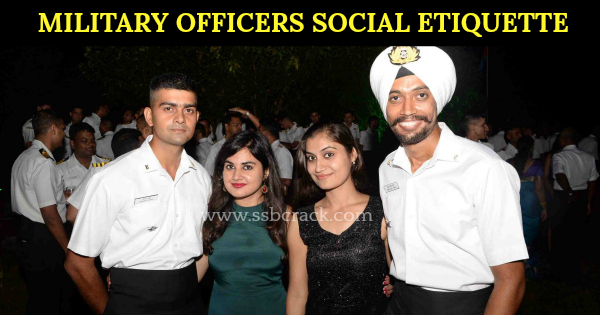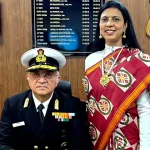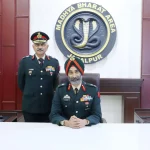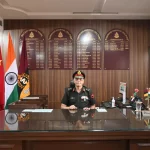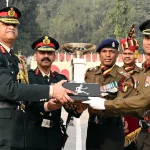There is a community interest in military stations far closer than is the case in civilian communities. Because of close and intimate contacts which are inherent to life in a military station, it is important that all rules of polite society are scrupulously observed. The social aspects of service life add greatly to its colour and enjoyment. Reception, dinners, dances, teas and other functions are held in essentially the same manner as in civilian communities, but the unity and community interest of service officers and their families are striking features of these events. Friendships are formed more quickly. Incomes tend to be parallel since most officers are dependent on their monthly salaries. In these circumstances, a proper observance of the social graces is expected of officers and their wives and families. A lack of neglect in these matters is prejudicial to the offender in the eyes of his or her associates.
Military Officers Social Etiquette
- General Behaviour. The following simple policies should be observed to derive greatest satisfaction from service life: –
- Strive to be at good terms with all. Choose close associates with care.
- Avoid open expressions of dislike as they generally lead to hostilities. Do not offend the susceptibilities of others.
- Social obligations should be repaid but strictly in accordance to one’s means without excuses for simplicity and austerity.
- All elders are to be addressed as “Sir” unless, they happen to be junior in rank. Always be courteous to the old and infirm.
- Avoid the tendency towards self-praise or discussing personal matters in general company.
- Never speak against reputations of the opposite sex.
- It is unbecoming of an officer to borrow money, and worse still, if he borrows from a lady.
- The officer should devote frequent periods of time to reading and studying and should cultivate an interest in national and world affairs as well as in the happenings of merely local interest.
- Correct Speech and Conversation.
- Use language which expresses your thoughts clearly beyond any possibility of misunderstanding.
- Use correct, simple and dignified speech, coupled with a capacity for intelligent and interesting conversation.
- Avoid slang and profanities.
- Think before you speak.
- Attitude towards Ladies: Nothing discloses the presence or absence of manners in a man as quickly as his attitude towards ladies. One of the established rules of the good society is that women deserve special consideration and protection. They should be shielded from unpleasant or embarrassing situations, assisted when confronted with difficulty and on all occasions, so treated, as will contribute most to their well being and happiness:
- Do not address officers’ wives or commanding officer’s wife as Bhabhiji or Aunty.
- Gentlemen do not remain seated in the presence of ladies who are standing.
- He should take off his hat when talking to a lady out of doors, unless it is raining.
- When in uniform, officers salute whenever they meet or greet a lady.
- When walking on a sidewalk with a lady, a man should walk on the kerb side. When walking with his wife he should walk on her right.
- Ladies should never be kept waiting for an appointment. It would be likewise impolite for a man to absent himself from a lady’s presence in a public place asking her to await his return, or to leave a lady whom you are escorting with someone else for an extended period.
- On all occasions a man’s dress should conform in degree of formality with that of the lady he is escorting.
- Avoid familiarity in association with ladies. Any public display of affections including the use of endearing terms leaves bad taste.
- A gentlemen should offer his seat to adult women and elderly men in a public conveyance.
- Ladies should always be served first, irrespective of occasions.
- Calling On: Calling On is one of the ways by which families and officers get to know each other. It helps in developing a friendly feeling in a unit or station
- Official Calls: On arrival at a station on duty or a visit, an officer is expected to call on the officer commanding the unit at his office within 24 hrs. If the commander is married and his wife is present in the station it is customary for the officer making the visit at the residence to be accompanied by his wife. These calls are formal and should not last longer than 15 mins. If the officers are of the same rank then the latest to arrive at the station must call on the other first.
- Courtesy Call: The interchange of visits between officers promotes friendship and cooperation. Calling is the principal means of families getting to know each other. It is a well established custom of the services and should be scrupulously observed.
- Calling Hour and Length of Calls. As a general guide, it is customary to call on between 7 pm and 7.30 pm on any working day after checking up the engagement of the officer being called on. The first call should rarely exceed 15 to 20 minutes. However, the subsequent calls may be of a longer duration, unless invited to stay on for dinner. Holidays should be left for officers and their families to devote to themselves.
- Dress for Social Calls. Social calls should never be made in uniform. A lounge suit, or appropriate formal apparel should be worn as per the dictates of the season and climate.
- Social Calls by Single/Married Officers. Single officers calling at the residence of married officers should enquire whether the lady of the house is at home. Etiquette followed in the case of married officers calling on single officers is that the former leaves only one of his cards when departing.
- Returning Calls. It is most important that calls should be returned promptly.
- Call for farewell. On being transferred from a station, it is a part of good etiquette to call on those who called on you previously to bid them “Good bye”.
- Calls of enquiries are made during illness or convalescence of a friend or acquaintance or when a family has experienced misfortune.
- Calls on condolence should be shortest.
- Invitation:
- Invitations are either formal or informal and must be answered in the form in which they are issued; that is, a formal invitation must be answered formally.
- All invitations should be sent out at least ten days in advance to enable the guest to plan his social commitments.
- Invitations to social functions should be accepted or denied promptly to enable the host and hostess to make the necessary arrangements.
- Receptions or other social events which are official or semi official are attended as a matter of duty.
- An invitation once accepted must not be declined except for reasons beyond one’s control.
- It is customary to extend to the houseguests of officers of the station invitations to the social gatherings to which their host has been invited. When senior officers are being invited their ADC/SOs/LOs should also be invited.
- The Officer’s Wife: The wife of a service officer plays a significant role in his life officially and unofficially. It is upon her that the main burden of social responsibility falls. Thoughtfulness and consideration for others on the part of the officer’s wife will pay large dividends towards happiness.
- The wife of the Commanding Officer of a unit or establishment usually assumes responsibility for welfare work within her husband’s command, particularly with regard to the families of the Junior Commissioned Officers and Other Ranks.
- It is the duty of all officers’ wives to tend every assistance in this very important task. They should not wait to be asked, but volunteer.
- The wives also help in organising functions to raise money for welfare purposes.
- The wife can act as an impediment or a great help in the development of leadership, depending on how well an officer makes his better half aware of the stringent requirements of leadership qualities of self sacrifice, service before self and the peculiarities of an Army career.
- The officer must prepare his wife for the peculiar exigencies of military life. She needs mental armour to enable her to take in her stride the sudden changes of plans ,often including separation, transfers and inconvenient changes of schools for children, which are unavoidable in the service.
- The elder lady in a station always helps a new comer to get settled and feel at home.
- Club Etiquette: The club serves as a gathering place for recreation while off duty for the officers and the families. All officers of a unit or establishment must take interest and pride in the activities of the club. A good club life is an important factor in stimulating morale. Every club has its rules and these should be ascertained by members and strictly adhered to. Unlike an officers’ mess it is not customary for an officer to rise from his chair in the club when a senior officer enters the room. The club is one place where officers and their families are expected to meet each other on equal terms irrespective of rank. It is a place of social gathering. However, it is in the observance of proper courtesy that a junior should rise when approached and addressed by a senior in conversation. In all cases when a lady joins or leaves a table, all gentlemen present must rise if seated, and if appropriate offer a seat.
- Dances:
- A gentleman is supposed to walk across to a lady for a dance. In case she declines for some reason he still says thank you and withdraws.
- If a lady is escorted by a male member, it is obligatory to seek the permission of the escort before asking the lady for a dance.
- After the completion of the dance the lady is required to be escorted back to her seat, and offered refreshment in case she so desires.
- During the dance, no boisterous moves, gestures, chewing of food or snacks, or extreme dance steps are resorted to.
- Dress: The hallmark of a good officer is to be dressed correctly. Only auth pattern of dress should be worn. Some of the guidelines are as under :-
- Winter. Lounge suit in the evening and combination/pullover with scarves in the daytime, depending on the formality of the occasion.
- Summer. Shirt and tie. Tie may be dispensed with on less formal occasions. Tie should be worn when a regimental band in ceremonial dress is in attendance.
- Fitting. Dress/uniforms must fit well.
- Socks. The colour of the socks must match the colour of shoes/ trousers worn.
- Shoes. Black/brown coloured shoes with laces are generally the best. Leather sandals when worn in casuals are always strapped on properly.
- A light coloured shirt and semi dark coloured trousers during day and a light coloured shirt and dark coloured trousers during evening/night are considered appropriate.
- In casuals, ‘T’ Shirts with slogans and jeans do not befit a gentleman.
- When in uniform, the use of umbrella and sunglasses is not proper.
- Jewellery. A plain signet ring with a monogram is the only thing an officer is permitted to wear when in uniform. Karas are worn by Sikh Officers and those who are commanding or serving with Sikh troops. Wearing of Kara by non-Sikh officers is incorrect.
- Lady Officer’s Jewellery. No ostentatious jewellery is to be worn with uniform. Wearing of small ear studs/ear rings, a thin chain around the neck not visible through the uniform and a single ring is permissible. Only one signet ring can be worn on the left hand ring finger. Mangal sutra can be worn in a manner so that no portion of it is visible outside the uniform.
- Tie. It should be dignified and a proper knot should be tied. It may also be worn with a half sleeved shirt during the day.
- Handkerchief. It should be either white or match the tie but should not be of the same design.
- Watches and Pens. Watches are normally worn on the left wrist. Pens and pencils should not be seen attached to the dress, like wise key chains/rings should not be dangling out from the pockets.
- Scents/Perfumes. Officers do not wear scents. A mildly perfumed after-shave lotion may however be used for social functions. Talcum powder, if used, should not be visible.
- Medals. Authorized medals should be worn in correct seniority.
- Coats. A double-breasted coat is always worn fully buttoned. Waistcoat of a three-piece suit is fully buttoned except for the lower most button. Coat of a three-piece suit need not be buttoned. In case of a three-button coat of a two-piece suit, only the centre button is buttoned. In case the suit has two buttons, one of them is required to be buttoned.
- Addressing:
- A Senior Officer should be addressed in a correct and respectful manner, but it should not show subservience.
- A lady should not be addressed as ‘madam’ or by her first name. She should be addressed for example as “Mrs Raina”.
- Officers’ are addressed by their rank and name.
- Conversation in Social/Formal Situations: The following guidelines should be followed:
- Never stick to a select group of people.
- Talk in a language that every one present understands.
- One must learn to segregate official life from social life. Therefore, never show pleasure or displeasure with another officer due to official business.
- Due courtesy should be shown to an elderly officer even if he is junior in rank.
- Never talk to a senior officer or a lady with your hands in the pockets.
- It is an accepted custom of the service and is in the best interest of good discipline that a superior officer will not admonish his junior i.e. an officer, JCO or NCO in the presence of subordinates; or, more particularly persons under the junior’s command.
- Don’t touch, pat at the back or push people while talking or laughing.
- Blasphemous, nasty, obscene conversation and swearing is forbidden in the mess.
- Similarly, no regimental business is discussed in the mess. No one must exhibit “feats of skills” in the mess, although in some regiments it is a norm to indulge in games after dinner nights. Discussion of routine service matters in the Mess is referred to as “talking shop”. One of the oldest tradition prohibits such discussion in the Mess. However, service matters of general interest to all are permissible.
- Marking on Private Vehicles: Official markings/insignias on private vehicles are not permitted, e.g. putting the unit/regiment insignia on four/two wheelers or writing the word “ARMY” on spare tyres/windscreen/number plates of vehicles etc is bad form.
- Dealing with Civilians: In the Services we are here to serve the people. We must make them feel that we, as officers, are always ready to associate ourselves with them as citizens of the land in our common efforts to serve our country, in our respective sphere of activity. We all therefore must make quite certain that we do not lay ourselves open to criticism by our people for lack of courtesy and good manners in our general conduct, both in public and private. As an officer, we must pay due respect to civilians, who are our seniors, colleagues and juniors and be as courteous as we can in civil life.
- Courtesy and good manners do not cost anything; we have to set an example to the rest of the country in regard to value of these two essential things, i.e. “courtesy” and “good manners”. Civilian staff employed for the Services should be treated with appropriate courtesy.
- Dealing with Police: The police are responsible for the maintenance of law and order and being our comrades in service, we should make an endeavour to assist them in doing their job effectively. No altercation of any sort should take place with the police. In an unavoidable situation the police/senior officers should be contacted instead of picking up an altercation with the policemen on duty, who maynot be fully aware of our rights.


